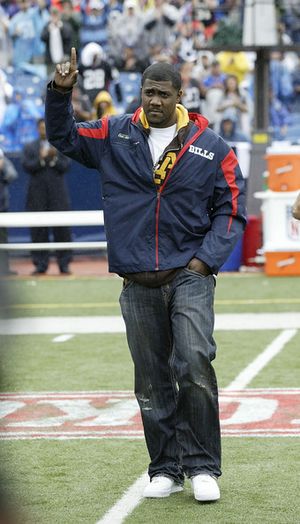Kevin Everett facts for kids

Everett walks onto the field to receive the George Halas award during halftime of the Seattle Seahawks and Buffalo Bills game on September 7, 2008
|
|||||
| No. 85 | |||||
|---|---|---|---|---|---|
| Position: | Tight end | ||||
| Personal information | |||||
| Born: | February 5, 1982 Port Arthur, Texas, U.S. |
||||
| Height: | 6 ft 4 in (1.93 m) | ||||
| Weight: | 253 lb (115 kg) | ||||
| Career information | |||||
| High school: | Thomas Jefferson (Port Arthur, Texas) |
||||
| College: |
|
||||
| NFL Draft: | 2005 / Round: 3 / Pick: 86 | ||||
| Career history | |||||
|
|||||
| Career highlights and awards | |||||
|
|||||
| Career NFL statistics | |||||
|
|||||
| Player stats at PFR | |||||
Kevin Everett is a former American football player. He was a tight end for the Buffalo Bills in the National Football League (NFL). Kevin was born on February 5, 1982.
He was chosen by the Bills in the 2005 NFL draft. Before joining the NFL, he played college football for the Miami Hurricanes. He had also played for Kilgore College, where his team had an amazing undefeated season in 2001.
Kevin's football career ended on September 9, 2007. He suffered a serious neck injury during a game. Doctors first thought he might not walk again. But Kevin showed incredible strength and determination. He worked hard and was able to walk publicly again by December 2007. His recovery inspired many people around the world.
Contents
Early Life and High School Football
Kevin Everett grew up in Port Arthur, Texas. He went to Thomas Jefferson High School. There, he played football for three years. In his senior year, 2000, he earned special honors. He was named Class 5A All-State, which means he was one of the best players in his state.
College Football Career
Kevin played college football at two different schools.
Playing for Kilgore College
Kevin first attended Kilgore College in Kilgore, Texas. He played there for two years. During his time, he was twice named a first-team All-Southwest Junior College football player. He was even ranked as the second-best junior college player in the entire nation. In his second year, he caught 18 passes for 310 yards. He also scored 2 touchdowns.
Joining the University of Miami
After Kilgore College, Kevin transferred to the University of Miami. He continued to play football there. His talent led him to be chosen by the Buffalo Bills in the 2005 NFL draft. He was the 86th player picked overall.
Professional Football Career
Kevin Everett joined the Buffalo Bills in 2005. He was a tight end, a position that catches passes and blocks.
Early Challenges and First Game
Kevin faced challenges early in his professional career. He missed the entire 2005 season due to a knee injury. This happened on his very first day of minicamp. He worked hard to recover from this injury.
He returned to play in 2006. He mostly played on special teams. These teams handle kickoffs and punts. On September 10, 2006, he made his first start in a game. He also made his first NFL catch on October 1 of that year. It was a one-yard gain from a deflected pass.
Life-Changing Injury and Amazing Recovery
On September 9, 2007, Kevin suffered a very serious neck injury. This happened during a game against the Denver Broncos. He was trying to tackle a player during a kickoff. He was taken off the field by ambulance. Doctors performed emergency surgery.
The injury was a fracture and dislocation of his cervical spine. This meant bones in his neck were broken and out of place. It also injured his spinal cord. Doctors were very worried. They said it was "life-threatening." They thought he might not be able to move his body below his shoulders. They believed he had a very small chance of walking again.
However, Kevin showed incredible progress. Just two days after his injury, he started moving his arms and legs. This was a huge surprise to everyone. Doctors became more hopeful. They thought he might even walk out of the hospital. One doctor, Dr. Barth Green, said Kevin's early movements meant he would likely walk again. He also mentioned a special cooling treatment that helped Kevin's spinal cord.
Kevin continued to get better. He regained movement in his hands. He worked hard in rehabilitation. By October 2007, he was able to walk "to an extent." He was released from the hospital to continue his rehab at home.
On December 7, Kevin could walk on his own. On December 23, 2007, he walked publicly on the field at Ralph Wilson Stadium. This was a very emotional moment for fans. He also appeared on a TV show in January 2008, walking clearly on his own.
In 2008, Kevin received the George Halas Award. This award is given to NFL players who overcome great adversity. He was also honored at the ESPY Awards for his amazing recovery. The Bills officially waived Kevin in May 2008. This allowed him to get lifetime disability benefits. The team made sure he played three full seasons to qualify for a full pension.
In 2012, Kevin shared his thoughts in an article. He said the five years since his injury had flown by. He was glad people still remembered him. He wished they remembered him for his plays, but he appreciated being remembered for his journey. Kevin's story is a powerful example of courage and hope.
 | Frances Mary Albrier |
 | Whitney Young |
 | Muhammad Ali |

